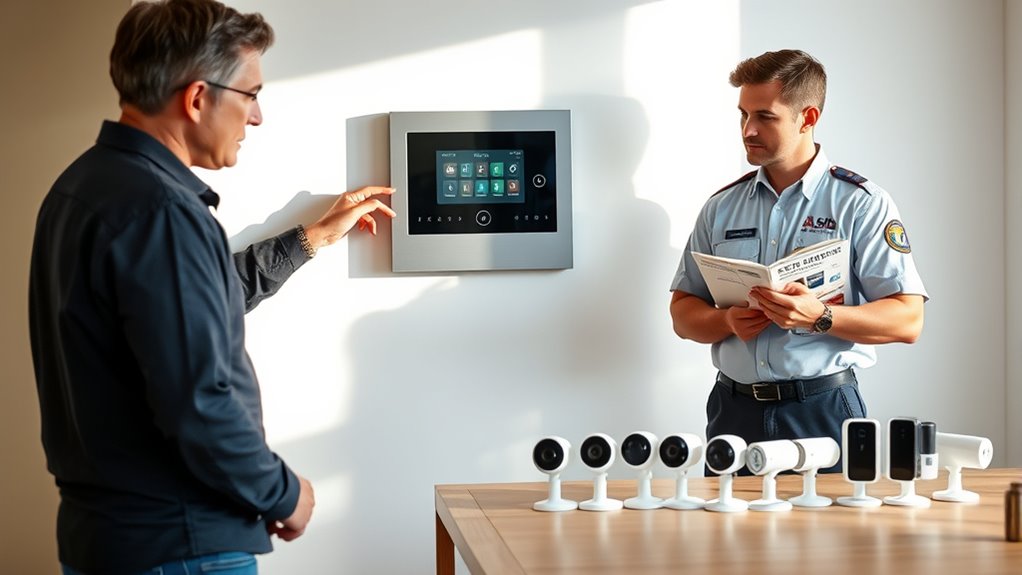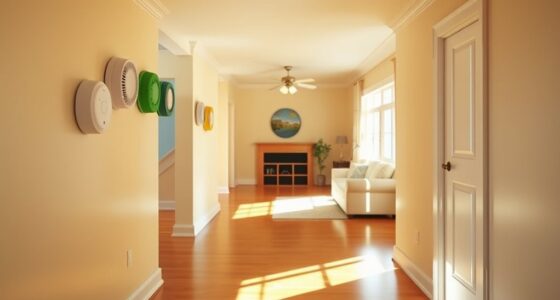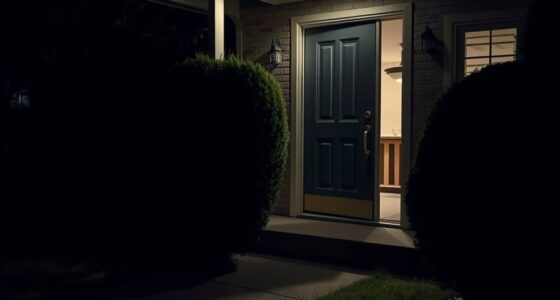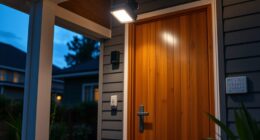To choose a reliable home security company, start by checking their core services like sensors, cameras, and smart home integration. Look for established providers with good reputations, strong customer support, and transparent pricing. Consider their system reliability through reviews and warranties, and verify they offer prompt, responsive service. Focusing on these factors helps you find a trusted partner. Keep exploring to uncover more tips on securing your home effectively.
Key Takeaways
- Verify the company’s industry reputation, experience, and customer reviews for proven reliability.
- Ensure they offer comprehensive core security services and integrate with your existing smart home devices.
- Confirm 24/7 customer support and prompt response times for effective issue resolution.
- Compare pricing, contract terms, and equipment costs to find the most cost-effective and transparent option.
- Assess system reliability through product quality, backup options, and positive feedback from current customers.
Understanding Core Security Services and Technology

To understand home security companies, it’s essential to know the core services they offer and the technology behind them. You’ll find intrusion detection tools like door and window sensors, motion detectors, and alarm systems built to catch potential intruders.
Surveillance involves high-definition cameras with night vision, providing real-time monitoring and recordings. Environmental monitoring systems detect hazards such as fire, smoke, carbon monoxide, and water leaks.
Remote access features via mobile apps let you control and monitor your system from anywhere. Many systems now integrate with smart home devices, allowing you to manage security, lighting, and locks seamlessly.
Key technologies include video doorbells, cloud storage, and motion sensors, all working together to keep your home safe, connected, and easily manageable.
Evaluating Company Experience and Industry Reputation

When selecting a home security company, it’s important to contemplate how much experience they bring to the table and what reputation they’ve built over the years. Look for companies like ADT, which has over 150 years of experience, indicating deep industry knowledge and ongoing innovation.
An established company often provides professional installation, ensuring ideal coverage. Check customer reviews and expert ratings—high scores, such as 9.8 out of 10 for ADT, reflect reliability. Additionally, evaluating their commitment to home improvement standards can provide insight into their dedication to quality and customer satisfaction.
Membership in industry associations, awards, and community engagement further boost credibility. Assess their reputation by examining feedback, certifications, safety standards, and third-party audits. Incorporating ethical hacking principles, such as thorough risk assessments and continuous monitoring, can also serve as a benchmark for their security practices. Moreover, their adherence to industry standards demonstrates a commitment to best practices and regulatory compliance.
A well-regarded company demonstrates consistent customer retention, loyalty, and a strong presence in the community—all signs of a trustworthy, experienced provider. Furthermore, verifying their industry reputation through independent sources can help confirm their credibility.
In addition, considering their use of AI technology to enhance security features can indicate a forward-thinking approach and commitment to innovation.
Assessing Customer Support and Service Quality

Evaluating customer support and service quality is essential for guaranteeing your home security provider meets your needs effectively. Look for companies that offer 24/7 support through multiple contact channels like phone, email, or chat, so help is always accessible. Prompt response times and efficient resolution of urgent issues are critical for your peace of mind. Also, ensure they provide support for non-urgent questions, showing they value thorough assistance. Consider the professionalism of technicians, their certification, and ongoing training, as these factors impact installation and maintenance quality. Review customer feedback and testimonials to gauge real-world service experiences. Additionally, check if the company offers clear communication and service guarantees, which demonstrate their commitment to high service standards. These elements collectively ensure reliable, responsive support when you need it most. One important aspect to consider is the customer support options, which significantly influence your overall satisfaction with the security system provider. To further ensure dependable service, look into service guarantees, which reflect the company’s confidence in their support quality. Moreover, researching response times can help you determine how quickly issues are addressed, safeguarding your home’s security. Also, examining their training programs for technicians can provide insight into the quality and consistency of service delivery. Understanding their industry standards can further help you evaluate whether the support and service quality meet professional benchmarks.
Reviewing Pricing, Contracts, and Cost-Effectiveness
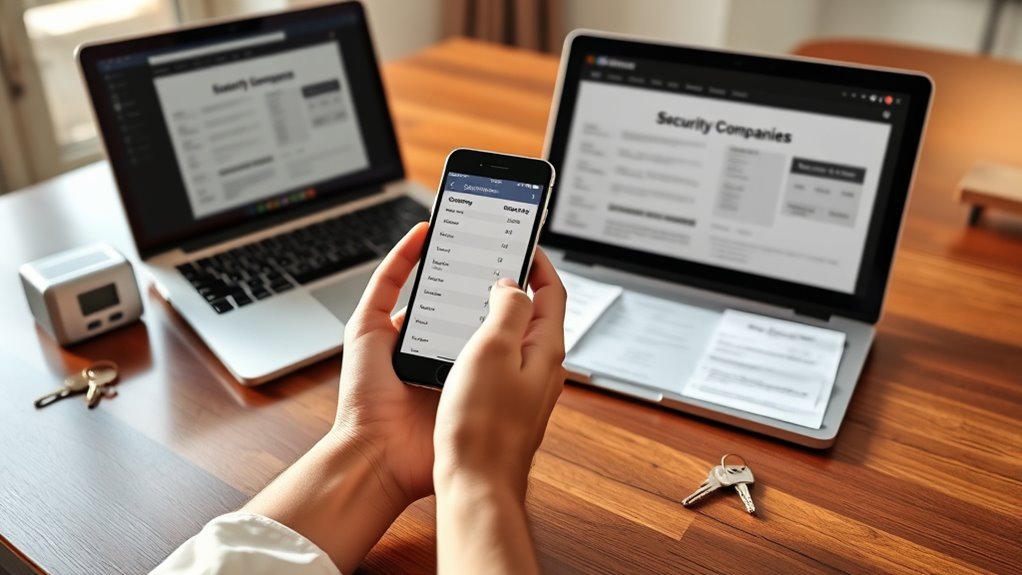
Understanding the costs involved in choosing a home security system helps you find options that fit your budget. Monthly monitoring fees vary from $4 to $60, depending on the provider and coverage. Some systems, like Ring, offer low fees, while others, such as SimpliSafe, allow self-monitoring with no monthly charge. Additionally, considering the availability of security device options can influence overall costs and system flexibility. Contract lengths range from no contract to multi-year commitments, with some companies offering flexibility or penalties for early termination. Equipment costs can be between $99 and $2,379, with options like refurbished systems or DIY installation saving money. Activation and installation fees may range from zero to $299, but promotions and free setup are common. Financing plans, discounts, and bundle deals help make costs more manageable, ensuring you find a system that balances affordability and features. Being aware of cost transparency can help prevent unexpected expenses during setup and maintenance. Furthermore, researching privacy policies and data security measures can be crucial since many systems collect sensitive information about your home.
Analyzing Customer Feedback and System Reliability
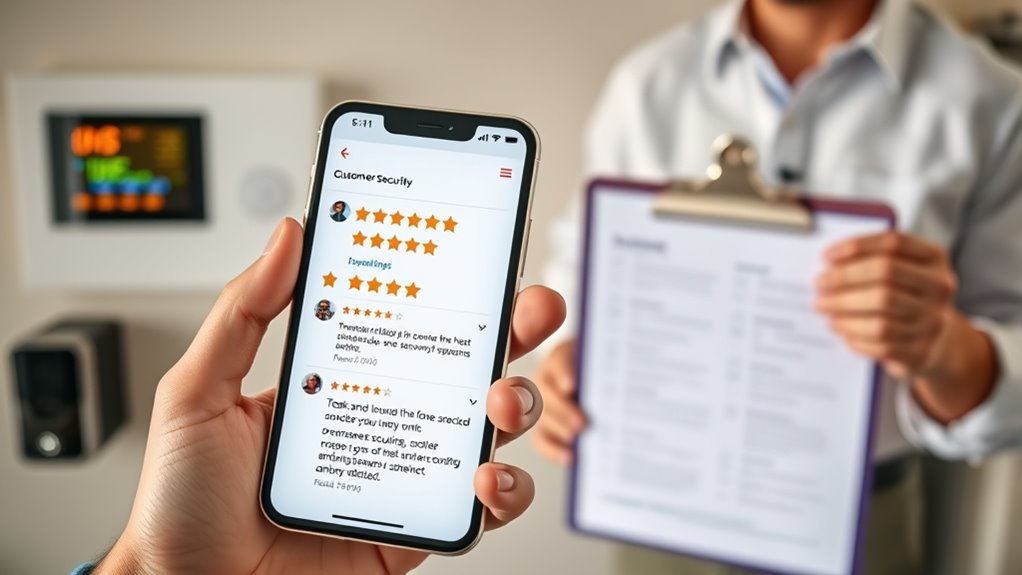
How can you determine if a home security system is truly dependable? Start by analyzing customer feedback on platforms like Trustpilot or Consumer Affairs. Look for consistent praise or complaints about equipment performance and system reliability. A strong reputation for system performance can signal trustworthy service. Reliable companies ensure their devices, like cameras and sensors, work smoothly without frequent malfunctions. Check how quickly customer service responds to issues—prompt support indicates responsiveness and professionalism. Consider the company’s problem resolution process, including repairs and replacements. Also, verify if the system offers redundancy or backup options, so your security remains intact during outages. Additionally, examining automation capabilities can provide insight into how well the system integrates with other smart home devices. Furthermore, reviewing the company’s local reputation and customer satisfaction scores can help gauge overall dependability. Finally, review ratings from sources like J.D. Power. High scores and positive reviews suggest the company provides dependable systems and excellent support, giving you confidence in your choice.
Frequently Asked Questions
How Do Security Companies Handle Emergency Situations Outside Regular Hours?
When an emergency happens outside regular hours, security companies connect your alarm system to a 24/7 monitoring center staffed with trained operators. They assess the alert, try to contact you for verification, and if needed, dispatch emergency responders like police or fire services.
They keep communication open, use advanced technology like cameras and sensors, and follow detailed emergency plans to guarantee swift, effective responses whenever you need help most.
What Are the Specific Certifications That Indicate a Reputable Home Security Provider?
When evaluating a home security provider, look for certifications like UL 611 and UL certifications, which show compliance with safety standards.
Industry-wide credentials such as SSAIB and Five Diamond certification signal trustworthy service.
For electronic systems, certifications like ESA’s CAT and CCTV, as well as company certifications like ISO 9001 or ISO 27001, demonstrate a commitment to quality and security.
These credentials guarantee you’re partnering with a reputable, experienced provider.
How Can I Verify the Authenticity of Online Customer Reviews?
You can verify online reviews by checking for verified purchase badges, which show the reviewer bought the product. Look for detailed, specific comments rather than vague praise or criticism.
Watch out for clusters of reviews posted on the same day or generic profiles with poor language skills. Use AI tools or platforms that detect fake reviews.
A mix of positive and negative feedback also indicates more authentic customer experiences.
What Are the Common Signs of a Unreliable or Scam Security Company?
You should watch for signs of a scam or unreliable security company, like unclear or hidden fees, and contracts that are confusing or unfair.
If they use aggressive sales tactics, exaggerate their services, or make unrealistic promises, be cautious.
Negative reviews, legal issues, or poor customer support also indicate trouble.
Trust your instincts—if something feels off, look elsewhere for a trustworthy security provider.
How Often Should I Update or Upgrade My Home Security System?
You might think your home security system is invincible, but in reality, technology evolves faster than you change your socks!
Experts recommend upgrading every five to ten years to stay ahead of hackers and new threats.
If your system’s over a decade old, it’s like using a flip phone in a smartphone world—time for an upgrade!
Regular updates guarantee your home remains as protected as a fortress.
Conclusion
Choosing a reliable home security company is like finding a trusted partner you can rely on. By understanding their services, checking their reputation, and listening to customer feedback, you guarantee your home stays safe. Don’t rush—take your time to compare options and ask questions. Remember, a good security provider is the shield that keeps your loved ones protected, just like a sturdy fortress standing strong against any threat.
